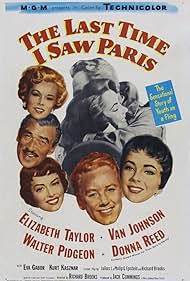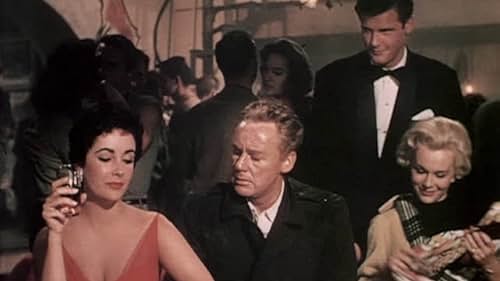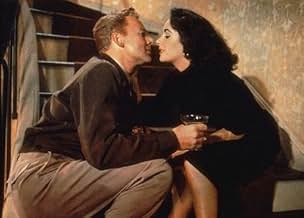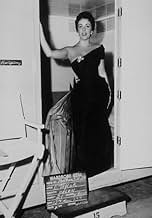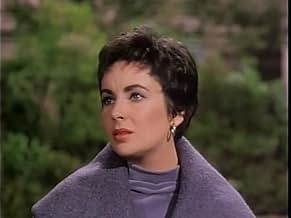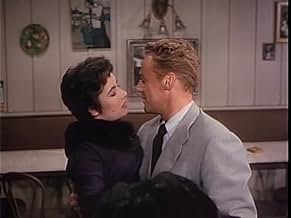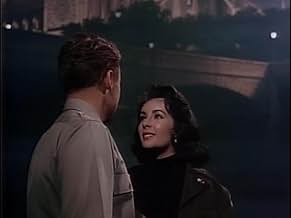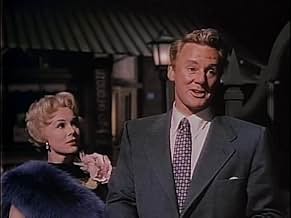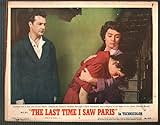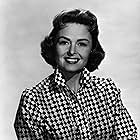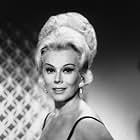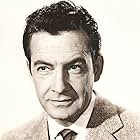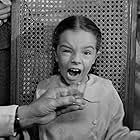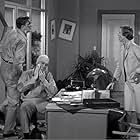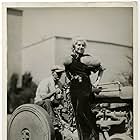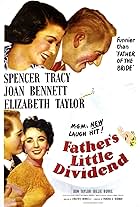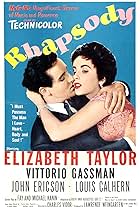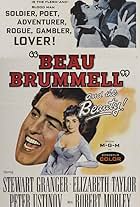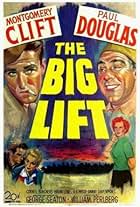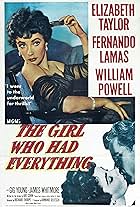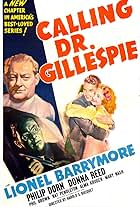IMDb RATING
6.1/10
4.4K
YOUR RATING
An American journalist returns to Paris - a city that gave him true love and deep grief.An American journalist returns to Paris - a city that gave him true love and deep grief.An American journalist returns to Paris - a city that gave him true love and deep grief.
Odette Myrtil
- Singer
- (as Odette)
Jacqueline Allen
- Background Singer
- (uncredited)
Don Anderson
- Party Guest
- (uncredited)
Max Barwyn
- German Man
- (uncredited)
Hal Bell
- Cafe Patron
- (uncredited)
- Director
- Writers
- All cast & crew
- Production, box office & more at IMDbPro
Storyline
Did you know
- TriviaBecause of an error with the Roman numerals in the copyright notice on the prints, this movie was legally copyrighted in 1944, not 1954. The copyright was not renewed by MGM as it expired ten years earlier than the copyright office records indicated (in eighteen years versus twenty-eight years). At this time it was the copyright notice and date on the film prints that counted legally, so this movie entered the public domain in 1972.
- GoofsIn the title screen at the beginning of the the movie it says "COPYRIGHT MCMXLIV IN U.S.A.", which in roman numbers is 1944, but the film was released in 1954, in roman numbers would be MCMLIV.
- Quotes
Helen Ellswirth: Do you mind if Paul takes me home?
Charles Wills: Paul who?
Helen Ellswirth: Paul anybody. Party like this, must be at least 6 or 7 Pauls
- ConnectionsEdited into The Extraordinary Seaman (1969)
- SoundtracksThe Last Time I Saw Paris
Music by Jerome Kern
Lyrics by Oscar Hammerstein II
Performed by Odette Myrtil
Featured review
The Last Time I saw Paris
Reviewed by Dan Cooper
This film was made in 1954, and by virtue of its age it becomes an easy target for those who would use it as a vehicle to pump up their own egos with a verbal bashing that will likely go unchallenged. The film has indeed been bashed, here on this database among other places, as unimportant and unworthy of your time as a possible rental choice.
I disagree completely with the uncalled for bashing, and with the judgement that the movie is unworthy of your time. See it for yourself. And if you are young enough to be completely unfamiliar with all of the actors, so much the better for you to judge it fairly on its merits rather than be snowed by the reputations of Hollywood personalities.
The plot has depth and very few weaknesses, the acting is good to very good, and the story has interest value in both historical and social frames of reference.
The plot concerns the uniting of two people whose tragic flaws are not well matched, with the obligatory tragic results. The pair gets together spinning out of a near-miss love triangle. The man (Van Johnson) has no idea of the existence of the triangle, as he is completely taken with Taylor and just as completely forgets his earlier attraction to the other woman (Donna Reed). Reed, the rejected third wheel, is actually not rejected, per se, but becomes the "odd man out" none the less when her sister (Liz Taylor) successfully steers the affections of the duped Johnson in her own direction instead.
Reed adopts the persona of the rejected party to a relationship that never was, and exacts her revenge later in the film.
While the big name actors of the day are no longer influencing moviegoers today, they undoubtedly sold the film in 1954. I find some weaknesses in both acting and directing, but the film is definitely worth seeing if you have never had the pleasure. Van Johnson's role is that of a fairly shallow character with a good heart but no follow-through to carry him to victory until way too late to do much good. Johnson possibly could have done more with the role, but the weakness of the character should not be confused with some partially perceived weakness in Johnson's delivery of the part.
Taylor does a nice job as the sly and experienced older sister, the one with the better looks and the Machiavellian technique to get whatever she wants, again at the expense of little sister Reed. The film is actually carried more by the acting of the supporting cast than by the efforts of the leads. Two very strong performances are put forth by Walter Pidgeon and George Dolenz. Pidgeon plays the opportunistic pretender to wealth and father of the two women. Dolenz is the earnest lover of Reed, who inherits her full-time attentions only after Johnson is fully occupied with Taylor. Dolenz marries Reed and in the end does a very nice job of becoming the film's heroic figure.
Eva Gabor at the peak of her youthful beauty does a good job as yet another love triangle component for the easily side-tracked Johnson after his marriage to Taylor. Another triangle develops with a very young Roger Moore finding the eye of Taylor.
Do yourself a favor and see this movie.
Dan Cooper is a freelance writer/editor. He has been writing for over 30 years and has done book and movie reviews sporadically since the 1970's.
Reviewed by Dan Cooper
This film was made in 1954, and by virtue of its age it becomes an easy target for those who would use it as a vehicle to pump up their own egos with a verbal bashing that will likely go unchallenged. The film has indeed been bashed, here on this database among other places, as unimportant and unworthy of your time as a possible rental choice.
I disagree completely with the uncalled for bashing, and with the judgement that the movie is unworthy of your time. See it for yourself. And if you are young enough to be completely unfamiliar with all of the actors, so much the better for you to judge it fairly on its merits rather than be snowed by the reputations of Hollywood personalities.
The plot has depth and very few weaknesses, the acting is good to very good, and the story has interest value in both historical and social frames of reference.
The plot concerns the uniting of two people whose tragic flaws are not well matched, with the obligatory tragic results. The pair gets together spinning out of a near-miss love triangle. The man (Van Johnson) has no idea of the existence of the triangle, as he is completely taken with Taylor and just as completely forgets his earlier attraction to the other woman (Donna Reed). Reed, the rejected third wheel, is actually not rejected, per se, but becomes the "odd man out" none the less when her sister (Liz Taylor) successfully steers the affections of the duped Johnson in her own direction instead.
Reed adopts the persona of the rejected party to a relationship that never was, and exacts her revenge later in the film.
While the big name actors of the day are no longer influencing moviegoers today, they undoubtedly sold the film in 1954. I find some weaknesses in both acting and directing, but the film is definitely worth seeing if you have never had the pleasure. Van Johnson's role is that of a fairly shallow character with a good heart but no follow-through to carry him to victory until way too late to do much good. Johnson possibly could have done more with the role, but the weakness of the character should not be confused with some partially perceived weakness in Johnson's delivery of the part.
Taylor does a nice job as the sly and experienced older sister, the one with the better looks and the Machiavellian technique to get whatever she wants, again at the expense of little sister Reed. The film is actually carried more by the acting of the supporting cast than by the efforts of the leads. Two very strong performances are put forth by Walter Pidgeon and George Dolenz. Pidgeon plays the opportunistic pretender to wealth and father of the two women. Dolenz is the earnest lover of Reed, who inherits her full-time attentions only after Johnson is fully occupied with Taylor. Dolenz marries Reed and in the end does a very nice job of becoming the film's heroic figure.
Eva Gabor at the peak of her youthful beauty does a good job as yet another love triangle component for the easily side-tracked Johnson after his marriage to Taylor. Another triangle develops with a very young Roger Moore finding the eye of Taylor.
Do yourself a favor and see this movie.
Dan Cooper is a freelance writer/editor. He has been writing for over 30 years and has done book and movie reviews sporadically since the 1970's.
- dancooper99
- Oct 16, 2002
- Permalink
Details
- Release date
- Country of origin
- Language
- Also known as
- La última vez que vi París
- Filming locations
- Production company
- See more company credits at IMDbPro
Box office
- Budget
- $1,960,000 (estimated)
- Gross worldwide
- $14,603
- Runtime1 hour 56 minutes
- Color
- Aspect ratio
- 1.75 : 1
Contribute to this page
Suggest an edit or add missing content

Top Gap
By what name was The Last Time I Saw Paris (1954) officially released in India in English?
Answer